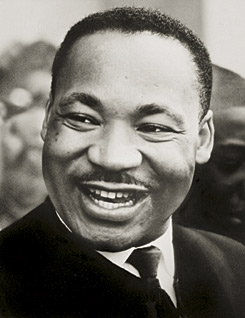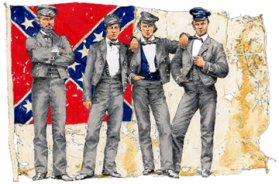Lost Causes, part II
B. K. Marcus recently complained about a Tom Toles cartoon which suggested that George Allen, the Republican ex-Senator from Virginia, is a Confederate sympathizer. I have no idea whether or not the cartoon reveals Tom Toles to be an arrogant ignoramus.
I don’t know much about how George Allen views himself in relation to the Confederacy. I do know that Marcus doesn’t strengthen his case by quoting–apparently with approval–the following bit of repulsive historical fudging by Jim Webb, the white Southern Democrat who recently defeated Allen in the Senate race:
I am not here to apologize for why they fought, although modern historians might contemplate that there truly were different perceptions in the North and South about those reasons, and that most Southern soldiers viewed the driving issue to be sovereignty rather than slavery. In 1860 fewer than five percent of the people in the South owned slaves, and fewer than twenty percent were involved with slavery in any capacity. Love of the Union was palpably stronger in the South than in the North before the war — just as overt patriotism is today — but it was tempered by a strong belief that state sovereignty existed prior to the Constitution, and that it had never been surrendered. Nor had Abraham Lincoln ended slavery in Kentucky and Missouri when those border states did not secede. Perhaps all of us might reread the writings of Alexander Stephens, a brilliant attorney who opposed secession but then became Vice President of the Confederacy, making a convincing legal argument that the constitutional compact was terminable. And who wryly commented at the outset of the war that
the North today presents the spectacle of a free people having gone to war to make freemen of slaves, while all they have as yet attained is to make slaves of themselves.— Remarks of James Webb at the Confederate Memorial (1990-06-03)
It’s not true, by the way, that fewer than twenty per cent
of Southerners were involved in slavery in any capacity.
In 1860, 39 per cent of Southerners were slaves; what Webb meant to talk about were white Southerners. But in any case, while only
about 1 in 5 of them directly profited from holding, selling, or driving the forced labor of the black Southerners, there’s no reason to assume that the people who set the course for government policy and war policy in the Confederacy were particularly representative of even the white citizens in whose names they professed to act. Whatever most Confederate soldiers may have thought, the policies and the orders and the justifications for the course the Confederacy took were largely set by, handed down by, and elaborated by, other men–the men who governed the Confederacy. One such man was that brilliant attorney
Alexander Stephens, and here is what he had to say about what the Confederacy stood for and fought for:
This new constitution. or form of government, constitutes the subject to which your attention will be partly invited. In reference to it, I make this first general remark: it amply secures all our ancient rights, franchises, and liberties. All the great principles of Magna Charta are retained in it. No citizen is deprived of life, liberty, or property, but by the judgment of his peers under the laws of the land. The great principle of religious liberty, which was the honor and pride of the old constitution, is still maintained and secured. All the essentials of the old constitution, which have endeared it to the hearts of the American people, have been preserved and perpetuated. Some changes have been made. Some of these I should have preferred not to have seen made; but other important changes do meet my cordial approbation. They form great improvements upon the old constitution. So, taking the whole new constitution, I have no hesitancy in giving it as my judgment that it is decidedly better than the old.
… But not to be tedious in enumerating the numerous changes for the better, allow me to allude to one other–though last, not least. The new constitution has put at rest, forever, all the agitating questions relating to our peculiar institution–African slavery as it exists amongst us–the proper status of the negro in our form of civilization. This was the immediate cause of the late rupture and present revolution. Jefferson in his forecast, had anticipated this, as the
rock upon which the old Union would split.He was right. What was conjecture with him, is now a realized fact. But whether he fully comprehended the great truth upon which that rock stood and stands, may be doubted. The prevailing ideas entertained by him and most of the leading statesmen at the time of the formation of the old constitution, were that the enslavement of the African was in violation of the laws of nature; that it was wrong in principle, socially, morally, and politically. It was an evil they knew not well how to deal with, but the general opinion of the men of that day was that, somehow or other in the order of Providence, the institution would be evanescent and pass away. This idea, though not incorporated in the constitution, was the prevailing idea at that time. The constitution, it is true, secured every essential guarantee to the institution while it should last, and hence no argument can be justly urged against the constitutional guarantees thus secured, because of the common sentiment of the day. Those ideas, however, were fundamentally wrong. They rested upon the assumption of the equality of races. This was an error. It was a sandy foundation, and the government built upon it fell when thestorm came and the wind blew.Our new government is founded upon exactly the opposite idea; its foundations are laid, its corner-stone rests, upon the great truth that the negro is not equal to the white man; that slavery–subordination to the superior race–is his natural and normal condition. This, our new government, is the first, in the history of the world, based upon this great physical, philosophical, and moral truth. This truth has been slow in the process of its development, like all other truths in the various departments of science. It has been so even amongst us. Many who hear me, perhaps, can recollect well, that this truth was not generally admitted, even within their day. The errors of the past generation still clung to many as late as twenty years ago. Those at the North, who still cling to these errors, with a zeal above knowledge, we justly denominate fanatics. All fanaticism springs from an aberration of the mind–from a defect in reasoning. It is a species of insanity. One of the most striking characteristics of insanity, in many instances, is forming correct conclusions from fancied or erroneous premises; so with the anti-slavery fanatics. Their conclusions are right if their premises were. They assume that the negro is equal, and hence conclude that he is entitled to equal privileges and rights with the white man. If their premises were correct, their conclusions would be logical and just–but their premise being wrong, their whole argument fails. I recollect once of having heard a gentleman from one of the northern States, of great power and ability, announce in the House of Representatives, with imposing effect, that we of the South would be compelled, ultimately, to yield upon this subject of slavery, that it was as impossible to war successfully against a principle in politics, as it was in physics or mechanics. That the principle would ultimately prevail. That we, in maintaining slavery as it exists with us, were warring against a principle, a principle founded in nature, the principle of the equality of men. The reply I made to him was, that upon his own grounds, we should, ultimately, succeed, and that he and his associates, in this crusade against our institutions, would ultimately fail. The truth announced, that it was as impossible to war successfully against a principle in politics as it was in physics and mechanics, I admitted; but told him that it was he, and those acting with him, who were warring against a principle. They were attempting to make things equal which the Creator had made unequal.
In the conflict thus far, success has been on our side, complete throughout the length and breadth of the Confederate States. It is upon this, as I have stated, our social fabric is firmly planted; and I cannot permit myself to doubt the ultimate success of a full recognition of this principle throughout the civilized and enlightened world.
As I have stated, the truth of this principle may be slow in development, as all truths are and ever have been, in the various branches of science. It was so with the principles announced by Galileo–it was so with Adam Smith and his principles of political economy. It was so with Harvey, and his theory of the circulation of the blood. It is stated that not a single one of the medical profession, living at the time of the announcement of the truths made by him, admitted them. Now, they are universally acknowledged. May we not, therefore, look with confidence to the ultimate universal acknowledgment of the truths upon which our system rests? It is the first government ever instituted upon the principles in strict conformity to nature, and the ordination of Providence, in furnishing the materials of human society. Many governments have been founded upon the principle of the subordination and serfdom of certain classes of the same race; such were and are in violation of the laws of nature. Our system commits no such violation of nature's laws. With us, all of the white race, however high or low, rich or poor, are equal in the eye of the law. Not so with the negro. Subordination is his place. He, by nature, or by the curse against Canaan, is fitted for that condition which he occupies in our system. The architect, in the construction of buildings, lays the foundation with the proper material-the granite; then comes the brick or the marble. The substratum of our society is made of the material fitted by nature for it, and by experience we know that it is best, not only for the superior, but for the inferior race, that it should be so. It is, indeed, in conformity with the ordinance of the Creator. It is not for us to inquire into the wisdom of His ordinances, or to question them. For His own purposes, He has made one race to differ from another, as He has made
one star to differ from another star in glory.The great objects of humanity are best attained when there is conformity to His laws and decrees, in the formation of governments as well as in all things else. Our confederacy is founded upon principles in strict conformity with these laws. This stone which was rejected by the first buildersis become the chief of the corner–the realcorner-stone–in our new edifice. I have been asked, what of the future? It has been apprehended by some that we would have arrayed against us the civilized world. I care not who or how many they may be against us, when we stand upon the eternal principles of truth, if we are true to ourselves and the principles for which we contend, we are obliged to, and must triumph.— Alexander H. Stephens (1861-03-21):
Cornerstone Speechin Savannah, Georgia
Unconditional secession from coercive governments is a human right, and the policy of Lincoln and his partisans during the Civil War was morally criminal. But far too many libertarians make the mistake of thinking that opposition to the rampaging mercantile empire in the North entails supporting, or at least carrying water for, the rampaging slave empire in the South. This antihistorical fetish for the Confederacy is regrettable.
 Today is Martin Luther King Jr. Day, a day to honor the life and the thought of Dr. King — a hagiographed, ignored, misunderstood, overrated, and indispensable man; one of our greatest Southern heroes; an agitator and a moral witness who gave long years of his life to the cause of the Freedom Movement, and who — underneath the television specials and the holy martyr imagery that so often serves to obscure and empty out his real, fallible, challenging, essential vision — played a vital role (together with
Today is Martin Luther King Jr. Day, a day to honor the life and the thought of Dr. King — a hagiographed, ignored, misunderstood, overrated, and indispensable man; one of our greatest Southern heroes; an agitator and a moral witness who gave long years of his life to the cause of the Freedom Movement, and who — underneath the television specials and the holy martyr imagery that so often serves to obscure and empty out his real, fallible, challenging, essential vision — played a vital role (together with 

 Here’s a detail from a piece of marketing flotsam that I found recently attached to the advertising section of some magazine or another: an insert hawking the
Here’s a detail from a piece of marketing flotsam that I found recently attached to the advertising section of some magazine or another: an insert hawking the